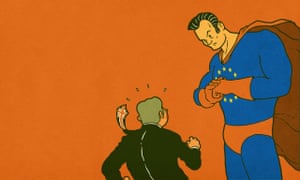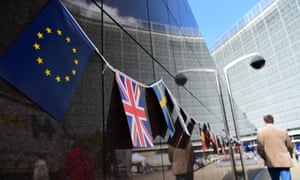As chief minister of Gujarat, Narendra Modi was a highly polarising figure. Due to the 2002 anti-Muslim riots that took place on his watch, Modi was anathema to leftists, liberals and even to a section on the right. After the riots, Atal Bihari Vajpayee, the Bharatiya Janata Party prime minister at that time, himself wanted Modi sacked as chief minister.
Yet, as the general election of 2014 approached, Modi’s base expanded. As the prime ministerial candidate, Modi ran a powerful campaign that focused on economic growth, limited government and liberalisation. The communal polarisation that had kept him in power in Gujarat was rarely addressed. Coming after the moribund United Progressive Alliance-II government, Modi presented an attractive economic pitch to many right-wing liberals.
The utilitarian approach
The mood of many right-wing liberals was captured by a much-discussed Gurcharan Das piece that was published in April, 2014, a few weeks before the election results were due. In his piece, Das, former CEO of Procter & Gamble, India, and an author and columnist, juxtaposed Modi’s communalism versus his promise of reform thus:
“There is a clear risk in voting for Modi — he is polarising, sectarian and authoritarian. There is a greater risk, however, in not voting for him. It is to not create jobs for 8-10 million youth that enter the market each year…There will always be a trade-off in values at the ballot box and those who place secularism above demographic dividend are wrong and elitist.”
As a thesis, this was utilitarian in the extreme. Das was not absolving Modi of the communal stain. He was simply saying it was outweighed by the benefits Modi would bring as an economic reformer. Three years down the line, how well has this bargain worked?
One end of the bargain
Novelist and political commentator Aatish Taseer said that his initial assessment of Modi was off the mark. “In 2014, I expected a mixture of economic vitality and chauvinism with Modi, but I was wrong,” said Taseer. “What India got was only chauvinism – and now we’re in an even deeper malaise”.
Taseer’s point is backed by data. In 2014, Das was clear that job creation was a moral imperative that outweighed ideals such as secularism. However, this argument is under severe strain three years later, given that job creation has ground to a halt under the Modi administration. India’s unemployment rate has actually increased since the Bharatiya Janata Party-led government took office. The number of jobs added by the Modi government in its three years in office is just 50% of the jobs added by the previous Manmohan Singh government in its final three years.
Even as the Modi government is unable to live up to its promise on increasing employment, it has also slipped on its promise of small government. In 2014, Modi ran for prime minister with the slogan “maximum governance, minimum government” – a thrilling prospect for India’s economic liberals, given how rare the concept is in India. Yet, as right-wing commentator Rupa Subramanya pointed out in a piece last month, the Modi-led Union government is “starting to slip back into the old command and control mode and away from the promise of good governance”.

Religious identity politics
Even as the vast majority of India’s population stagnates economically, religious identity has emerged as the main axis of Indian politics. For the past three years, politics around the cow has taken centre stage, with vigilante groups attacking Muslims and Dalits across the country on the suspicion of cattle smuggling and slaughter.
Political columnist Tavleen Singh supported Modi in 2014. Yet, on May 7, Singh wrote,
“It is hard to understand why a Prime Minister so passionate about making India a modern, digital, prosperous country has seemingly not noticed that hunting and killing Muslims on the pretext of cows and love jihad does not sit well with modernity.”
Speaking to Scroll.in, Singh said, “I think I misjudged him. I thought he was a liberaliser.”
In Swarajya, a magazine that describes itself as “a big tent for liberal right of centre discourse”, senior journalist Seetha argued that right-wing liberals are “disappointed at his [Modi’s] inability to get the BJP-ruled state governments to rein in the hardline/fringe elements and vigilante groups”.
Seetha specifically called out the appointment of the far right Adityanath as the chief minister of Uttar Pradesh in March to buttress her point.
Hobson’s choice
Gurcharan Das, though, is still sticking to his 2014 analysis. “Jobs are plummeting all over the world,” argued Das, defending Modi’s poor job-creation record. “This is due to automation. I am not sure what other policies could have been pursued to make it better.”
Das is also sanguine about the BJP’s record on law and order. “Yes, there have been stray events such as gau rakshak attacks,” he said. “There has been no sort of state-planned murder or anything.”
Das is disappointed with the fact that Modi has been unable to raise India’s ease of doing business ranking but said, overall, he would still support the BJP were he given a chance to turn back the clock to 2014. “There is nobody else,” explained Das.
The TINA or “there is no alternative” argument, however, is something that punctuates most critiques of Modi from his right-wing liberal supporters.
“Modi and the BJP is still the best option,” said Tavleen Singh. “Compare him with Nitish [Kumar], Lalu [Yadav] or Rahul Gandhi. That is why he wins; because the voter can see he is the best option.”
Liberal irrelevance
In the end, the fact that Modi can coolly ignore his right-wing liberal supporters and still end up being backed by them might serve to illustrate how increasingly irrelevant India’s tiny liberal elite – both right and left – are becoming to the political discourse. Maybe nothing captures this better than the Union government’s demonetisation of Rs 500 and Rs 1,000 banknotes late last year. The move went against every liberal principle of limited government and had few economic benefits. Sadanand Dhume, a Wall Street Journal columnist and a prominent supporter of Modi during the 2014 elections called the move a “debacle”.
Yet, Modi simply brushed aside this criticism and converted what was an economic disaster into a political windfall. Months after demonetisation was announced, the BJP won a landslide victory in India’s most populous state, Uttar Pradesh. If 2014 saw a provisional alliance between right-wing liberals and Hindutva groups, three years since, it is clear that right-wing liberals are getting increasingly marginalised. For the last two years of the Modi adminstration’s term, it seems the Hindutva right will call the shots within the BJP.





